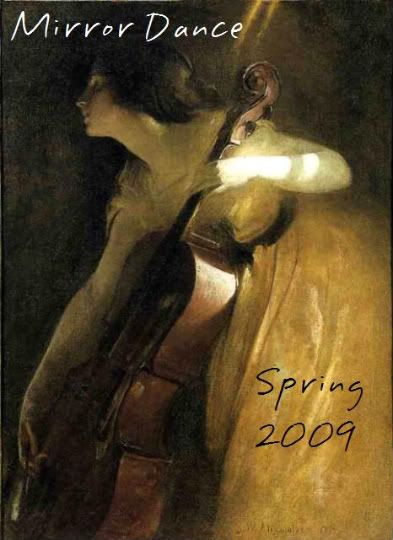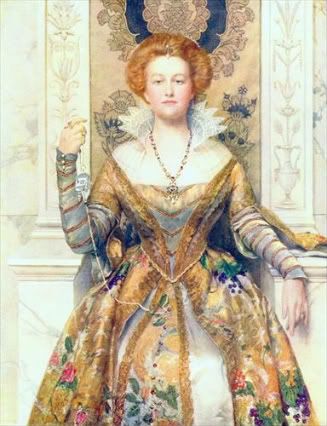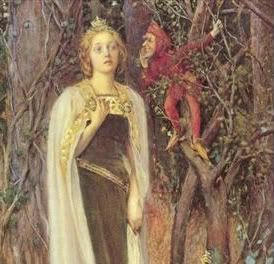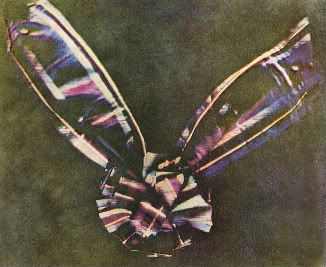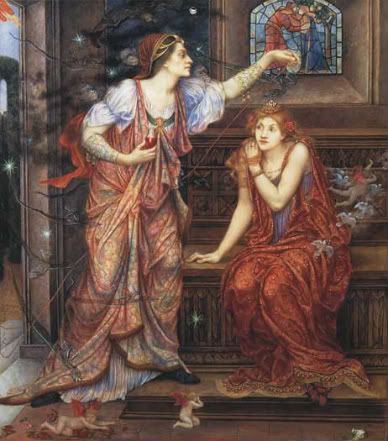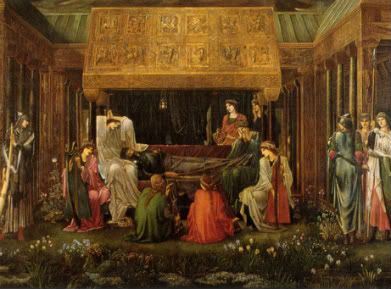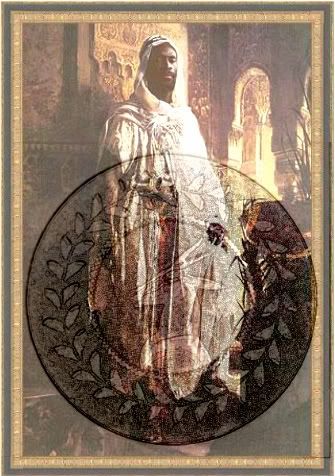Out of Love and Obligation
by Molly Schwanz
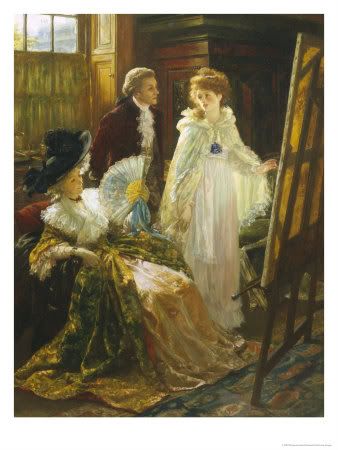
Gabriel felt the small, ice cold hand slip into his own. “They’re talking about you again,” Sasha whispered.
“I know,” he muttered, trying not to move his lips. The last thing Gabriel needed was to be thought crazy for being seen talking to someone who wasn’t there.
“Oh, surely you’ve heard,” the first woman said. “It’s absolutely tragic.”
“No.” The second woman, in Gabriel’s opinion, sounded far too interested. ”Who is he?”
Gabriel sighed, wondering which version of the tale would be told this time.
The first woman shot a glance over her shoulder at the black-haired young man sitting against the tree, half his face obscured from view by a black silk blindfold. She took her companion’s arm and led her down the path, out of the gentleman’s range of hearing. Gabriel smiled to himself as their voices faded. A polite noblewoman. Now, there was an interesting turn of events.
“He’s Gabriel Vercingeto, the Duke of Tyree,” the polite woman answered, grinning at the second one's reaction.
The second woman gasped. “No!”
The polite one nodded.
“Are you sure? Gabriel Vercingeto, reduced to that!”
“He was blinded when he was caught spying in Verine.”
The second nodded this time. “You’re right. Most tragic.”
“It was tragic when
I died, too,” Sasha whined. “You’re not even dead, Gabriel. Why do you get all the glory?”
Gabriel chuckled. “Because no one but me remembers you, imp.”
* * * Isobel looked up as the cold raindrops pattered on her shoulders. The two twittering courtiers had vanished, leaving her alone with the young duke who appeared oblivious to the breaking storm. She suspected she’d best tell him to get out of the weather.
“Your Grace,” Isobel said, reaching out to touch the back of Gabriel’s hand. He jumped, and she wondered if he had been asleep. It
was rather hard to tell. He turned to face her, following the sound of her voice. “Your Grace, it's raining.”
Gabriel shivered against a cold gust of wind, though the storm was not unseasonable for late autumn. “So it is.” Rising, he placed one hand against the bark of the tree, feeling the now familiar fear rising in his throat. If he let go of the tree, he would have no landmark. He had been waiting on the return of his page... But the boy was unreliable, and had undoubtedly wandered off to pursuits more interesting than playing nursemaid to a disfigured duke.
Gabriel sighed and held out his free hand to Isobel. “Miss, I fear I must beg a favor. I don’t believe I can find my way by myself, but if you could guide me, I would be most grateful.” Although he couldn’t see her smile, Gabriel felt Isobel lightly grasp his hand. Her fingers were chill, though not deathly so, like his sister’s. Gathering his courage, Gabriel let go of the tree to follow her inside.
The warm blast of air informed Gabriel when they had reached shelter.
“Where may I lead you, Your Grace?” asked his guide.
Gabriel considered. “The great hall, I suppose. They’ll be serving dinner shortly.”
“Yes, Your Grace.”
The chatter of the court grew loud long before they reached the hall. “Your destination, Your Grace,” Isobel announced.
Gabriel gripped the doorframe, and the girl slipped her hand from his. He heard the click of her heels as she turned to go.
“Wait!” There was a swish of fabric as she turned.
“Yes, Your Grace?”
“May I ask your name?”
The girl laughed lightly. “Isobel.”
“Isobel.” Gabriel nodded. “Thank you.”
“Not at all, Your Grace.”
* * * Varian watched from his seat at the table as Gabriel spoke with the young servant girl. He found Gabriel fascinating.
Poor little duke, he thought, as Gabriel carefully made his way to his seat. Varian shot a glance at Mikhail Pryderi, Gabriel’s former lover, and leaned across the table to address him.
“So, My Lord, why aren’t you sitting with your Gabriel?”
Mikhail too had been watching Gabriel, and Varian thought guilt flitted across Mikhail’s face before Mikhail molded it into his usual sneer, transforming him from a man into the Baron Cohmra.
“Mind how you speak to your betters, artist.” He slung an arm around the shoulder of his dinner partner, a pretty blonde girl who gazed at him adoringly.
“This is what happens when you allow commoners in the court,” she said, reaching over and tucking Mikhail’s own blond curls behind his ear. “Besides, you couldn’t be seen with Gabriel now. He’s so ugly!”
Varian laughed silently, biting his tongue on a cruel retort.
Then why, madam, can he be seen with you? He knew the girl was only a replacement for Gabriel, to hide the fact that Mikhail had left Gabriel for the very reason she had stated.
There was dancing after dinner. Varian watched over Madelina’s shoulder as Gabriel stood next to the wall, speaking with those who offered him their sympathy. The dance ended, and Varian escorted Madelina off the dance floor, in search of something to drink. As he handed her a glass, she grabbed his wrist. Taking the glass, she turned his hand over, shaking her head.
“Varian, you must learn to get the paint out from under your fingernails.”
Varian laughed, raising an eyebrow. “Why should I bother? It won’t make the nobles look down on me any less.”
“True,” Del said, fingering a spot of blue in Varian’s brown curls. “But washing the paint out of your hair might.”
Varian shrugged. “Maybe.” He smiled. “I prefer the company of a musician such as you to theirs anyway.”
Del continued to shake her head, but she was laughing.
* * * The next afternoon, a frustrated Varian had been pacing long enough to wear a path in the wooden floor boards of his studio. He cursed and hurled his paintbrush away, splattering the wall with green. The canvas mocked him. Varian was charged with creating a painting for the new ballroom, to be finished by mid-winter, in time for the annual festivities. He mustn’t fail. He would starve to death if he failed. Varian sighed, and decided a walk was in order to clear his head.
* * * A light breeze blew through the library's open windows. As he trailed his fingers over the embossed spines, Gabriel could almost make out the volumes' titles. He had, after all, read most of them. Quite suddenly, someone reached around him and took the book from under his fingers. Gabriel clenched his teeth, trying to force down the panic he felt at having someone standing so close behind him.
“Ah, the poetry of Alexias St. Michael, one of my favorites.”
Gabriel turned to face the man behind him, keeping one hand on the bookshelf. “I fear I don’t remember much of it,” Gabriel said. “Also, I haven’t the slightest idea who you are.”
Varian laughed. “Varian, the current resident artist,” he replied. He audibly tapped the cover of the book he still held. “I could read this to you, if you like.”
Gabriel stammered. Such generosity from a stranger was quite unexpected. “I... I would love that. Thank you.”
“Come here, then.” Varian placed a hand on the small of Gabriel’s back, and guided him to a bench set into the library’s bay windows.
As Varian read, Gabriel listened with a spy’s trained ear. Varian’s accent marked him as city born, though Gabriel did not find it unpleasant to listen to.
Varian watched, gratified, as the small smile appeared on Gabriel’s face.
* * * “So?” Sasha asked when Gabriel returned to his room. “Do you like him?”
Gabriel sighed, irritated with her for a reason he couldn’t identify. “Don’t meddle in my love life, Sasha.”
The eight-year-old girl swung her legs, whacking the heels of her shoes against the chair legs. “I'm not meddling. I'm protecting.”
“How is this protecting?”
“I don’t want you to get hurt again, like Mikhail hurt you.”
“There isn't much you can do, Sasha. I’m all right. Really. You can move on to your afterlife now. It’s been, what, nineteen years since you fell in that lake?”
Sasha wasn’t offended by the mention of her death. “Look what happened in Verine. You still need me to look after you.”
Gabriel snorted. He was twenty-three and the specter of his older sister thought he needed protection. Terrific.
* * * The half-finished canvas still glared back at him. Varian thought about getting rid of it and beginning again. His tools lay idle, paint drying in the brushes and coating Varian's hands as he raked them through his hair. He was furious that he couldn’t figure out what his painting lacked, though the landscape outside his window shifted from its autumn gold into early winter grays.
Varian paused to scrub the paint from his hands before meeting Gabriel in the library. Gabriel was sitting by the window waiting for him, practically basking in the rare sunlight.
Gabriel smiled, turning towards the sound of familiar footsteps. “Good morning.”
Varian took Gabriel’s hand and tugged him to his feet. Gabriel leaned against him, his cane hooked over his free arm.
“It’s such a nice day,” Varian began. “I thought we ought to go outside.”
“Outside?”
Varian grinned. “Picnic.”
Gabriel laughed and nodded his assent.
* * * They picnicked in the center of an untrimmed hedge maze in the south gardens, preferring peace and quiet to the fountains and exotic plants of the more fashionable locales. Gabriel dozed comfortably beneath a giant oak as Varian sat leaning against the trunk, sketching the roofs of the palace above the hedges. He hummed to himself, an old song from his childhood in the city, the only other sound the scratch of his pencil.
The peace of the afternoon was rent by a sudden harsh cry. Varian jumped, startled. Gabriel was sitting up, head in his hands, his breath coming in sobs. Varian cast his papers aside. When he wrapped his arms around Gabriel’s shoulders, Varian could feel him shaking.
“Gabriel? What’s wrong?” he whispered.
Gabriel swallowed hard. “It’s nothing. Just a nightmare.”
Varian frowned at him in concern. “About your time in Verine?” he asked.
Gabriel nodded, and Varian pulled him closer. Gabriel rested his head on Varian’s shoulder.
“Would it help... Do you want to tell me about it? You haven’t told anyone what happened, really.”
“No,” Gabriel said. “I told you, it’s just a nightmare. It’s nothing.”
Nonetheless, Varian held Gabriel until he stopped shaking.
* * * Varian frowned at Gabriel’s closed door, the gears in his head whirring fruitlessly. It had taken Gabriel a long time to calm down and his voice had sounded dead when he bid Varian farewell.
Well, Varian thought,
I can’t stand outside his door forever. He could, however, interrogate Gabriel’s page.
Dominic, dismissed by Gabriel but under strict orders from Prince Constantine to keep a close eye on His Grace, sat against the wall, a book of military history nicked from Gabriel’s private collection propped open on his knee.
Varian nudged him with one booted foot. Dominic jumped to his feet, the book disappearing behind his back.
“Yes, sir?”
“Has Gabriel ever said anything about his time in Verine?”
“To me, sir? He wouldn't. I'm just a servant.”
Varian sighed. “Of course. Thank you.”
“Sir?”
Varian paused. “Yes?”
“If I may say so, it’s not Verine that makes His Grace so upset.”
Varian blinked. Shock struck him dumb for a moment before he managed, “What is it, then?”
Dominic chewed on a fingernail for a moment. “It’s Lord Mikhail. His Lordship’s a sorcerer, you know. His Grace expected Lord Mikhail to come break him out of prison. Or at the very least to be here for him when His Grace returned.”
“A
sorcerer?”
“Mhm.”
Varian approximated a smile. “Thank you, Dominic, this has been most enlightening.”
“Glad to be of service, sir.”
* * * Lord Mikhail’s office was deep in the old, subterranean part of the palace. Arches of stone held the weight of the building above as Varian carried a lantern through the gloomy winding hallways.
Mikhail’s name was attached to the door on a brass plate. Varian knocked.
“It’s open!” Mikhail called from the other side. Varian entered. And stared. Here, the columns of the arches had been painted: red, blue, and gold. And between them...
“Stained glass windows.”
Mikhail removed his glasses, refraining from rubbing his forehead with ink-stained fingers. “It’s an illusion. What do you need?”
“I want to talk about Gabriel.”
“What about him?” Mikhail’s voice was hard as slate.
“You’re a sorcerer. You can make all this.” Varian gestured to the opulence of the room. “Then why did you leave Gabriel in a dungeon to rot?”
Mikhail groaned, hiding his face in his hands. “Do you think you’re the first one to ask that? No one knew anything was wrong until we received the note from Prince Vlad, asking that we pick Gabriel up at the border!”
One of the few things that Varian, or anyone for that matter, had managed to pry out of Gabriel was that his escape had been facilitated by the queen’s rebellious son, to whom Gabriel had promised Onienis’ assistance in his uprising.
“You didn’t know?”
“Telepathy,” Mikhail said dispassionately, “is not one of my gifts.”
“Oh.” Varian hesitated. “Do you think you could heal his eyes, at least?”
Mikhail glared. The illusory stained glass crackled. “Some things simply cannot be fixed by sorcery. Besides, do I look like a healer to you?”
Varian backed towards the door. “No?”
Mikhail nodded curtly. “Good. Now get out. I don’t have to answer to the likes of you.”
Varian fled.
* * * His work couldn’t stop simply because Mikhail had nearly frightened him to death. Varian trudged up from the city, the first snowfall crunching under his boots, a package of paint pigments tucked under his arm. He ducked his head against the wind and shivered.
This weather is going to get worse before I get back to the palace. Preoccupied with his own misery, he didn’t hear the footsteps until it was too late.
“Varian d’Ghyaci!”
Varian’s head snapped up. The man who stood before him was considerably taller than Varian, and he was grinning. When Varian tried to flee, he found himself surrounded. The leader spoke.
“It seems we’ve found ourselves a spy, gentlemen. And you all know the bounty His Highness is paying for spies, especially those from Verine.”
Knowing he could not run, Varian prepared himself to fight, although he knew it was hopeless. The last thing he felt was the heavy blow connecting with the back of his head.
* * * Gabriel sighed when he heard the clock chime a quarter past six in the evening. He paced, idly running his bow over the strings of his violin. A melancholy melody sounded from the instrument. The cold wind whistled against the windows, a counterpoint to his playing.
Sasha sat in front of the fireplace, knees drawn up to her chest, though the flames could not warm her. She hated winter. She turned when Gabriel’s playing stopped. He laid the instrument in its case.
“Varian should have been here hours ago.”
“Mhm,” she agreed. “You're worried?”
“Of course I’m worried. We’re in the middle of a snowstorm.”
“Don’t remind me,” Sasha answered grumpily. She sighed. Guilt gnawed at her because she hadn't been able to protect Gabriel in Verine, hadn't been able to travel that far from the place where she'd died. But here was something she could help with. “Do you want me to see if I can find him?” she offered.
“Could you?”
She grinned. “Of course. Anything for my little brother.” And so saying, she vanished.
* * * Varian awoke to a splitting pain in his head. When he tried to lift his hands to examine the damage, he was hindered by the manacles on his wrists. His prison was so dark that he was unable to make out even the other walls of his cell through the blackness. With a shudder, Varian realized that this was the sort of blackness Gabriel faced daily. Thinking of self-defence, and of pride, he forced himself to stand when he heard footsteps in the hall. The door opened and a several guards dragged him from the room.
* * * Sasha walked straight through the closed door and into the guards’ mess hall. She’d spend hours pacing through the city, unable to find a single trace of her brother’s lover until, returning to the palace, she’d seen several soldiers counting out the gold coins the prince had paid them as a bounty. On a hunch, she went to the guardhouse to investigate.
“A Verine spy, in the palace for months. Can you believe it?”
Another chimed in. “And staying in the Duke of Tyree’s bed, no less!”
“Ah, yes, well, can we blame him? Perhaps if Duke Gabriel had been a better spy, he wouldn’t be blind.”
Sasha had heard enough. She went to check on Varian before returning to her brother’s side.
* * * Gabriel’s heart flooded with relief when he heard the knock at his door. He fumbled with the lock in his haste.
But the low voice that asked, “Gabriel?” didn’t belong to Varian, though Gabriel did recognize it. It was Mikhail’s.
“What do you want?” Gabriel demanded, face twisting into a snarl.
“May I come in?” Gabriel knew Mikhail well enough to know he wouldn’t go away until he had gotten what he wanted. He stepped away from the door to allow Mikhail to enter.
Mikhail sighed. “Gabriel, I know you hate me, but I came into possession of some information I thought you might value.”
“And that is?”
“Your Varian has been arrested as a spy.”
Gabriel felt the words like a blow. “What?”
“Varian,” Mikhail repeated slowly, “has been arrested as Verine spy.”
“That’s not possible.” Gabriel’s voice was little more than a growl. Mikhail shrugged, forgetting Gabriel couldn’t see the gesture.
“I just thought you’d like to know.”
“Get out,” Gabriel snarled. Mikhail bolted, and Gabriel slammed the door behind him.
* * * They shoved him back into his cell, and Varian lost his balance, falling face first to the flagstones. He hurt all over. No matter how he had protested, his captors hadn’t believed that he wasn’t a spy. Finally alone, he allowed himself to cry. He wouldn’t see Gabriel again. He knew it. He would die here.
“There, there, now. Don’t cry.”
Varian drew a sharp breath. “Who’s there?”
It took a great deal of energy for Sasha to make herself visible to most people, energy she hated to expend. But Varian was important to her brother, and her brother was important to her, so it was worth it.
Varian watched in amazement as a luminescent fog appeared in a few feet in front of him. The glow resolved itself into a small girl. Her features were startlingly familiar, but Varian’s head ached, and he couldn’t place them.
Glowing, Sasha thought.
Is there anything more melodramatic a ghost can do? But it was necessary.
Would it have killed them to put in a window? “Hello.” She announced herself, smiling reassuringly. “I’m Sasha.”
Varian continued to stare, mouth ajar.
“Sasha? Sasha Vercingeto?” She sighed. “I see that my brother hasn’t mentioned me.”
Well, Varian thought.
That explains why Gabriel is always talking to himself. “Are you, um, dead?” he asked.
“Yes. I thought I’d check on you. It's the least I can do for him, seeing as you mean the world to my little brother.”
“I do?”
“Of course. Now, don’t fret. I’m sure Gabriel will have you out of here in a few days at most. You’re not mortally wounded or anything else requiring immediate intervention, are you?”
Varian shook his head.
Sasha nodded. “Good. Then I’ll go tell Gabriel where you are. Try not to die or anything.”
Without so much as a good-bye, she vanished through the cell door. Varian let his head rest against the stone wall. The old noble families certainly had some interesting quirks.
* * * Gabriel had not stopped pacing. Sasha watched as he tripped over a footstool. He stopped halfway through his stream of vicious curses when he heard Sasha’s giggle.
“Well,” he joked, “at least I don’t go
through the furniture.”
“True,” Sasha agreed. “I found Varian for you.”
“He’s been arrested.”
Sasha pouted. “How did you know that?”
“Mikhail came and told me. The question
now is what I do about it.”
At first, Gabriel had his doubts as to whether Mikhail was telling him the truth. But there was no doubt that Constantine’s intelligence organization was holding Varian, now that Sasha had confirmed it.
Sasha broke in on his thoughts. “If I may make an observation?”
Gabriel righted the footstool and sat on it, bruised legs stretched out in front of him. “By all means.”
“Prince Constantine did promise you the position as his master-of-spies when you returned from Verine. There weren’t any conditions upon the manner of your return. So, technically...”
“Technically, I can go and demand to see Varian, and they can’t deny me.”
“Exactly.”
Gabriel grabbed his coat and headed out the door. “Thank you, Sasha.”
“I’m only here to help, after all.”
* * * This time when Varian heard the key turn in the lock, he didn’t bother standing. It hurt too much. The door opened and an elegant man stood in the frame, back lit by the ruddy torchlight in the hallway, another figure standing behind him and to the side.
“Leave the light.”
The guard bowed, handing him the lantern. “Yes, Your Grace.”
The door clicked closed. The man sighed, placing the lantern on the floor against the wall, where he wouldn't accidentally kick it over.
“Gabriel?” Varian whispered, pushing himself painfully upright.
Gabriel stood against the closed door, his arms crossed. “Well?”
“Gabriel, what... I never... I haven't done anything, I swear!”
Gabriel followed the sound of Varian's voice, and Varian found himself pinned to the wall, with Gabriel's hand at his throat.
“Who are you, really?” Gabriel asked coldly. “And don't you dare lie to me.” As much as Gabriel hated to treat Varian this way, if Constantine's intelligencers had arrested him, Gabriel had to believe it was for a reason.
Varian panicked, his chained hands tugging at Gabriel's. He had forgotten that Gabriel had once been a warrior. It was quite easy to forget; Gabriel was quite good at hiding his temper.
“Gabe... I can't breathe...” Varian managed to gasp. Gabriel released him, stepping back as Varian collapsed.
“I trusted you, Varian. I want the truth from you.” Varian closed his eyes; hating the pain in Gabriel's voice.
“I know what they're telling you, Gabriel, but I'm not a spy.”
“Really,” Gabriel said. Varian knew Gabriel didn't believe him.
“No, I wouldn't. Yes, I'm from Verine, but I came to Onienis when I was very young. My mother was a noblewoman who had fallen in love with an Onienien soldier, but he was killed in battle. After that, well,” Varian shrugged. “My grandfather wrote, saying he would allow my mother to return home, so long as she didn't bring me with her.” He sighed. “She was young, I guess. She left me at the Queen's Orphanage in the city.”
Gabriel slid down the wall to sit next to Varian. “So, what is your full name, then?”
“Varian d'Ghyaci. I never use the surname as it tends to lead to questions about my heritage.” Varian dried his tears on the back of his hand, chains clanking.
Gabriel frowned. “I'll have to look into this.”
Varian's heart sank. “You don't believe me.”
“Oh, I believe you, but I need to be sure. I can't go around ordering prisoners to be released simply because I happen to be in love with them. Besides,” Gabriel said, smiling in an attempt at levity, “that city accent of yours would be quite hard to fake, were you lying about your upbringing.” Gabriel clambered to his feet. “Don't worry, Vari. I'll come back, whether or not I can find proof of your story.
* * * Gabriel went himself to the ramshackle buildings of the Queen's Orphanage.
The coach rolled to a stop, and Gabriel descended to a warm welcome from the orphanage's headmistress.
He was escorted down a short hallway to an office. The room was cold, and Gabriel did not hear the crackle of a fire. He suspected they couldn't afford the wood.
“Tea, Your Grace?” the headmistress asked from somewhere near his elbow. He nodded, and she pressed a warm cup into his hands. He gratefully wrapped his palms around it.
“To what do we owe the pleasure of this visit?”
Gabriel sighed. “I was wondering if you could find something in your records for me. I need to know if a lad named Varian lived here. He would have left, oh, eight years ago.”
Drawers squeaked and papers rustled while she searched. Gabriel waited impatiently, fiddling with the handle on his teacup.
“Here it is. Varian d'Ghyaci, records begin in 1439 at age five, and continue through 1450. Was there anything in particular you were looking for?”
Gabriel sighed in relief, feeling as though he hadn't taken a breath since he heard of Varian's arrest. He smiled. “No, thank you. That's all I needed.”
* * * Sasha was waiting for him in the carriage.
“So, what did she say?” Sasha asked, as Gabriel sat huddled under his coat, Varian's file on his knee.
“He's innocent.”
“And you like him?”
Gabriel frowned. “Why do you care so much, Sasha?”
She shrugged. “Because I want you to be happy?”
He sighed. “I wish you hadn't died.”
Sasha smiled. Gabriel grew candid when he was tired. “Me too.”
* * * The fever claimed Varian's senses. He knew not how much time had passed since Gabriel had promised to return. One thought kept him from despair.
He promised to come back. He won't leave me here, he promised... * * * When the guard opened Varian's cell door, Gabriel had expected a greeting other than the tomb-still silence he was met with.
“Varian?”
No response, not the slightest rattle of chains. “Guard!” Gabriel snapped. The soldier knelt, freeing Varian's wrists from their manacles.
“He's ill, Your Grace.”
Gabriel swore. “Have someone take him to my rooms. And fetch a healer.”
* * * Varian's cheek rested on something scratchy. And glittery, he realized, prying his eyes open. Something that rose and fell with the sleeper's steady breaths. He smiled for a moment, smoothing into place a thread on Gabriel's embroidered coat. Gabriel had fallen asleep atop the coverlet, boots still on.
Varian carefully extracted himself from the duke's arms. Gabriel's hair was strewn across the pillows like raven feathers. Dawn light streamed through the windows, painting the scene with such
colors! He lay his head back down, with at least one burden off his mind. He knew what to paint now.
“Vari? Are you awake?”
“Yes.”
Varian was silent for a moment. “How long have I been here?”
Gabriel stood, dislodging Varian. “About two days.” He straightened his coat. “I've delivered proof of your innocence. You can expect an official apology.”
“Thank you, Gabriel.”
Gabriel smiled. “My pleasure.” Dominic knocked and pushed the door open.
“Dinner, Your Grace?” Varian's stomach growled. Gabriel laughed.
“By all means.”
* * * Over stew and fresh bread, Varian asked, “Are you going to take up your position as spymaster officially, then?”
“Well,” Gabriel said, “It's time I did more than sit around and listen to you read poetry all day, as much as I enjoy it.”
* * * The next few weeks passed swiftly as Gabriel took up his new position, and Varian once again took up his paintbrushes.
Five days before Prince Constantine's midwinter masque, Varian hesitated outside Mikhail's door. He
really didn't want to do this, but Mikhail was the best person to ask. Gritting his teeth, he knocked.
“Come in!” Mikhail called. The office was the same. It was as though Mikhail hadn't moved since their last explosive interview.
Mikhail looked up. “Oh. You are the last person I was expecting.”
Varian tried to rub a drop of paint from his hand. “I had a question, and I thought you might be the best person to ask.”
“Oh?” Mikhail leaned back in his chair. “What is it?”
“Well...” Varian hesitated. “Before his trip to Verine, what color were Gabriel's eyes?”
Mikhail hadn't been expecting such an easy question. “They were blue. Deep blue.”
“Thank you, My Lord.” Varian bowed and closed the door softly behind him.
* * * “So, Vari, I take it you finished your painting?” Gabriel asked as they prepared for the masque. Gabriel was pleased; his blindfold dispelled the need for a mask.
“Yes.”
“May I ask what you painted at last?”
“Phospheros.”
“The star god. An interesting choice.”
“Well,” Varian answered, “I thought it appropriate for the darkest time of year.”
* * * “They're staring at us,” Varian whispered as they entered the ballroom.
Gabriel laughed. “They're courtiers. Staring and gossiping are their favorite forms of entertainment. Don't let them bother you.”
They lost themselves amongst the crowd, but Madelina found them. She dragged Gabriel onto the dance floor. Varian, uncomfortable surrounded by so many nobles, hovered along the party's edges. He jumped, almost spilling his wine, when Prince Constantine snuck up behind him.
“Very good, Mr. d'Ghyaci. I didn't think you'd finish in time.”
A painting of the dark-haired star god dominated the ballroom, done so skilfully that the dancers imagined it actually emitted starlight. But most startling of all were the god's lively blue eyes.
Varian blushed. The painting had only been finished the evening before, which he suspected Constantine knew.
“Your subject looks familiar,” the prince mused. “Do we know the model?”
Varian smiled, gazing out across the dance floor as Madelina led Gabriel in a waltz. “It's possible, Your Highness.”
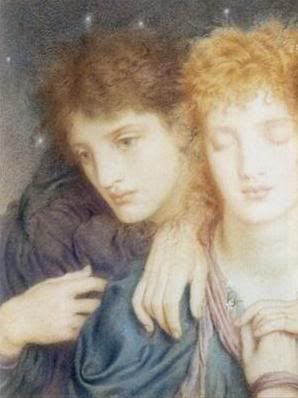
Gabriel had retired from the ball early, completely exhausted. His nightmares, however, didn’t care how badly he needed the sleep. Gabriel leaned out the open window, chasing away his nightmare with the cold winter air. He was grateful, at least, that he hadn't woken Varian.
A small hand tugged at his sleeve.
“Sasha?”
“Who else?” She answered. “I wanted to say good bye.”
“Good-bye? What do you mean 'good-bye?’” Gabriel had always thought of Sasha as one of the few constants in his life.
“You don't need me to take care of you anymore. You have Varian for that now.” He could hear the smile in her voice. “My work here is complete.”
Gabriel chuckled softly. “So you deem him acceptable, do you?”
“I do,” she said firmly. “Good-bye, Gabriel. I love you.”
“Good-bye, Sasha.”
The room warmed a few degrees before he even closed the window, and he knew she was gone.
“Who are you talking to?” Varian asked.
Gabriel smiled. “Just my sister. But don't worry, she's gone home now.”
Varian snorted. “It's about time.”
* * *Molly Schwanz comes from a family of historians and therefore is an undergraduate student of Medieval and Renaissance History. This is her first published story
Where do you get the ideas for your stories? I get the ideas from historical figures, from folklore, and from long, enforced periods of doing such as a bus ride in which the bits of information in my brain can mix themselves together in interesting ways.
